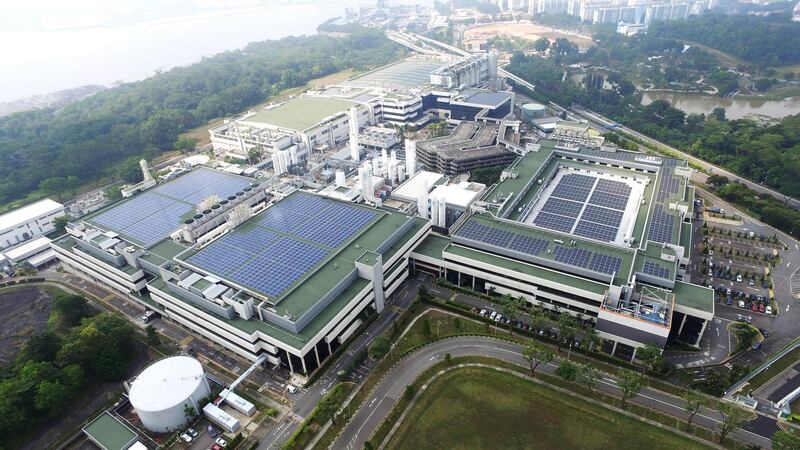Globalfoundries, one of the top semiconductor manufacturers, is co-investing $4 billion in a new plant in Singapore to address an ongoing shortage of chips that is affecting the automotive and electronics industries worldwide.
The US company, a unit of Abu Dhabi's Mubadala Investment Company, will finance the expansion using its own investments and those of government and long-term customers, said chief executive Thomas Caulfield during an online ground-breaking ceremony on Tuesday.
“We are expanding our global manufacturing footprint, starting with a new fab [foundry] in Singapore,” he said.
“This is a true symbol of what can be achieved by combining government and customers’ partnerships and GF investments.”
The US company will spend $1bn each to expand manufacturing capacity in the US and Germany over the next two years, he told a separate media briefing on Tuesday.
In March, Globalfoundries said it plans to invest $1.4bn in 2021 to expand its manufacturing capacity across Singapore, Europe and the US.
“Globalfoundries is currently the only global semiconductor manufacturer of scale with a global footprint and we are stepping up and meeting the challenges of the global semiconductor shortage by accelerating our investment – not only in Singapore but around the world,” said Mr Caulfield.
“Working in close collaboration with our customers and the government of Singapore is a recipe of success that we are pioneering here and looking forward to replicating in the future – in Europe and [the] US.”
Automotive manufacturers and electronics companies, including some of the world’s biggest computer and smartphone makers, face a chip shortage that has been exacerbated by the Covid-19 pandemic, which disrupted global supply chains.
Car manufacturers such as Germany's Volkswagen and Ford and General Motors in the US had to trim production due to a chip shortage, prompting the semiconductor industry to boost investments to plug the supply gap.
In March, Intel said it will invest $20bn to expand its manufacturing facilities as it expects chip shortages to spill over into next year.
In the same month, Taiwan's TSMC unveiled plans to invest $100bn over the next three years to increase its production capacity.
Semiconductor manufacturers also intend to capitalise on future demand growth sparked by growing digitisation after the onset of the pandemic.
The global market is set to expand by 19.7 per cent this year and hit $573bn next year as growth slows to 8.8 per cent, according to World Semiconductor Trade Statistics, a global trade body representing chip makers. The growth will be mainly driven by demand for memory chips.
“It took 50 years for the industry to grow to $500bn today and now it is estimated that the industry will grow to $1 trillion in roughly eight years,” said Mr Caulfield. “It is hard to overstate the amount of investment and focus [needed] in order to meet this challenge.”
The new 23,000 square metre plant will be adjacent to the company's existing campus. It will boost production of 300-millimetre-wafers by 450,000 a year, taking the total capacity of its Singapore centre to 1.5 million 300mm wafers annually. The new foundry will create 1,000 high-skilled jobs.
“We have several long-term customer agreements in place,” said Mr Caulfield.
The company has more than 250 global customers and currently operates nine manufacturing centres in the US, Germany and Singapore.
Mubadala group chief executive Khaldoon Al Mubarak said the investment in the new Singapore plant was timely, given the growing importance of chips in every aspect of life.
The pandemic has also accelerated technology trends across the healthcare, FinTech, satellite communications, education, automation, mobility and enterprise sectors and “semiconductors are vital to all these sectors, which are in themselves long-term investment priorities at Mubadala”, he said.
Since the onset of Covid-19, “the need for the companies to be digital first has accelerated at an outstanding rate and it has required almost every company, every government worldwide to adapt and think like a tech company”, he said.







